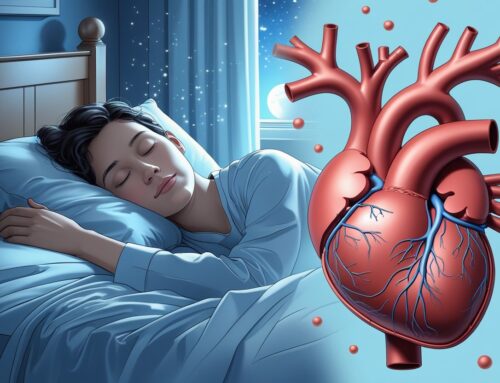Good sleep can add years to your life. Studies show that men who sleep well can live around five years longer, and women about two years longer, compared to those who don’t get enough rest. It’s not just the number of hours that matters but also the quality of your sleep.
Regular, deep sleep gives your body time to repair and recharge. When sleep is poor or disrupted, the risk of serious health problems like heart disease, diabetes, and dementia goes up. Over time, these issues can shorten your life. That’s why building consistent sleep habits isn’t just about feeling rested, it’s about staying healthy for longer.
Taking sleep seriously can improve both daily life and overall lifespan. Simple steps like keeping a steady bedtime, avoiding too much screen time at night, and creating a calm sleep space can help. When problems like insomnia are caught early, it’s easier to get back on track.
Key Takeaways
- Getting enough quality sleep supports a longer life.
- Consistent sleep patterns help lower the risk of chronic illnesses.
- Healthy sleep habits support long-term health and well-being.
- A supportive, breathable mattress helps keep the body aligned, encourages deep sleep, and can support better long-term health.
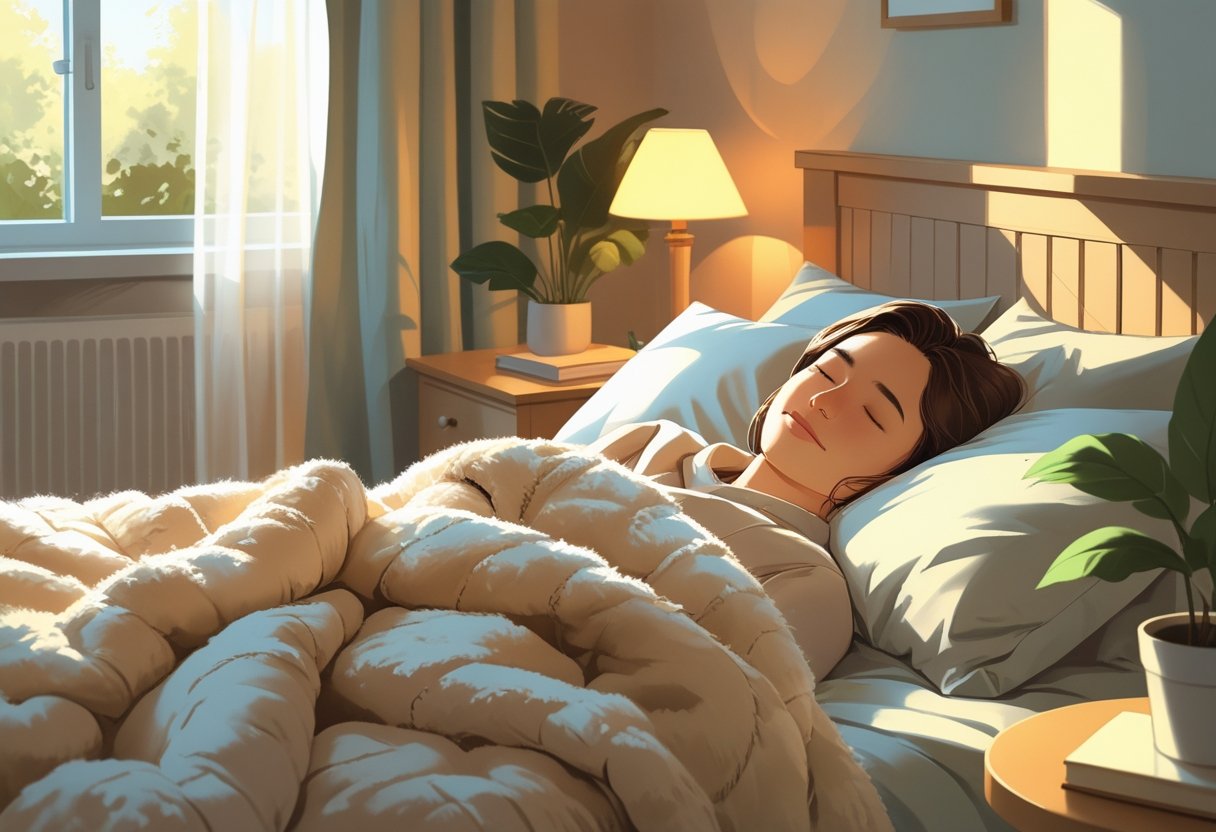
The Connection Between Sleep and Longevity

Sleep has a strong effect on how the body works and ages. It impacts heart health, brain function, and how well the body fights illness. Getting enough good sleep can help protect against serious health problems and support a longer, healthier life.
How Sleep Impacts Life Expectancy
Good sleep is closely linked to living longer. Research shows that men who sleep well can live about five years longer than those who don’t. For women, it can add around two extra years. When people don’t get enough rest, their risk for heart disease, diabetes, and dementia goes up. These conditions can shorten life.
Sleep keeps the heart stable, the brain sharp, and the immune system strong. It also helps with stress and mental health. When the body gets the rest it needs, it has a better chance of staying healthy for many years.
Scientific Evidence on Sleep Duration and Lifespan
A study involving more than 170,000 adults shows that both too little and too much sleep can raise the risk of dying early. People who sleep fewer than seven hours or more than nine hours a night have higher mortality rates. Those who sleep between seven and nine hours tend to live longer.
Regular sleep patterns also matter. Older adults with stable sleep schedules have better overall health and live longer. Graphs studying sleep and lifespan show a U-shaped pattern. Sleeping too little or too much can shorten life, while a steady, moderate amount of sleep is linked to the best outcomes.
Biological Mechanisms Linking Sleep and Aging
Sleep affects aging at the cellular level. During deep sleep, the body repairs tissues and removes waste from the brain. This slows down the buildup of damage that comes with age. It also helps control metabolism and inflammation. Poor sleep raises stress hormones, which can speed up aging and increase the chance of chronic illness.
Good sleep supports healthy cholesterol levels and stable heart function. These processes explain why regular, quality sleep is linked to a longer and healthier life. For more information, see the findings on the role of sleep in longevity and health span.
Optimal Sleep Duration for a Longer Life
Sleep takes up about a third of a person’s life. In a 75-year lifespan, that’s roughly 25 years spent in bed. How well and how long someone sleeps can affect how long they live. The right amount of sleep depends on age, sex, and personal needs.
Recommended Sleep Hours by Age
Sleep needs change throughout life. Newborns need the most, around 14 to 17 hours each day. Kids and teens usually need 8 to 11 hours to help their bodies and brains grow.
For adults, 7 to 8 hours a night is the sweet spot. This supports heart health, brain activity, and hormone balance. People over 65 still need about 7 hours, though their sleep pattern may shift with age. Adults spend a big part of their lives asleep. A person who lives to 75 may spend 25 years resting. This is why getting good sleep matters for long-term health.
The U-Shaped Curve: Risks of Too Little or Too Much Sleep
Sleeping too little or too much can harm the body. Research shows people who sleep around 7 to 8 hours a night live longer than those who sleep far less or far more. Less than 6 hours can lead to health issues like heart problems, diabetes, and memory decline. More than 9 hours has also been linked to health risks, sometimes caused by hidden medical problems.
With the right amount of sleep, blood pressure and heart rate are more stable, which supports better health over time.
Differences by Sex and Individual Factors
Men and women may not get the same benefits from sleep. Studies show men who sleep enough may live about five years longer. For women, it’s about two years. Other factors also matter. Genetics, lifestyle, and health conditions can change how much sleep someone needs. A small number of people naturally sleep less and still feel fine. But most need at least 7 hours to recharge and keep their bodies working well.
Sleep patterns can shift with age, stress, or illness. This is why finding the right amount of sleep for your body plays a big role in living a longer, healthier life.

Quality Versus Quantity: Why Sleep Habits Matter
Sleep plays a big part in how long and how well we live. It’s not just about how many hours a person sleeps. The way someone sleeps and the timing of their sleep can affect how their body works and how likely they are to get sick.
What Defines Good Sleep Quality
Good sleep means waking up feeling refreshed and alert. It’s being able to fall asleep without trouble, staying asleep through the night, and getting deep rest.
Signs of good sleep include:
- Restfulness: Feeling recharged in the morning.
- Minimal disturbances: No waking up again and again at night.
- Sleep depth: Enough time in deep and REM sleep for the body to recover.
- No daytime tiredness: Staying awake and focused during the day.
When sleep quality is poor, a person may feel tired, moody, or struggle to think clearly. Even if they spend a lot of time in bed, broken or light sleep can still leave them drained. Good sleep helps memory, supports the immune system, and protects the heart, all of which are important for living longer.
Consistency and Circadian Rhythms
Going to bed and waking up at the same time each day keeps the body’s internal clock in check. This clock, called the circadian rhythm, controls things like hormones, temperature, and metabolism.
When sleep schedules stay consistent, it helps the body:
- Keep hormones like melatonin and cortisol in balance.
- Use energy more efficiently.
- Maintain a better mood and focus.
But when sleep is irregular, it can lead to problems over time. Irregular schedules have been tied to higher risks of heart disease, obesity, and diabetes. Keeping a regular sleep pattern may be more important for long-term health than just getting extra hours of sleep.
Impact of Sleep Stages on Longevity
Sleep happens in cycles. Each cycle has stages: light sleep, deep sleep, and REM sleep. These stages help the body and mind recover.
- Deep sleep helps repair the body, build immunity, and regulate hormones.
- REM sleep supports memory, emotions, and brain function.
If someone doesn’t get enough time in these stages, their health can suffer even if they spend plenty of hours in bed. Losing deep or REM sleep over time is linked to aging, heart problems, and cognitive decline. Balancing sleep stages every night supports both physical and mental health. Good sleep quality and a steady sleep schedule work hand in hand to help a person live longer and stay healthy.
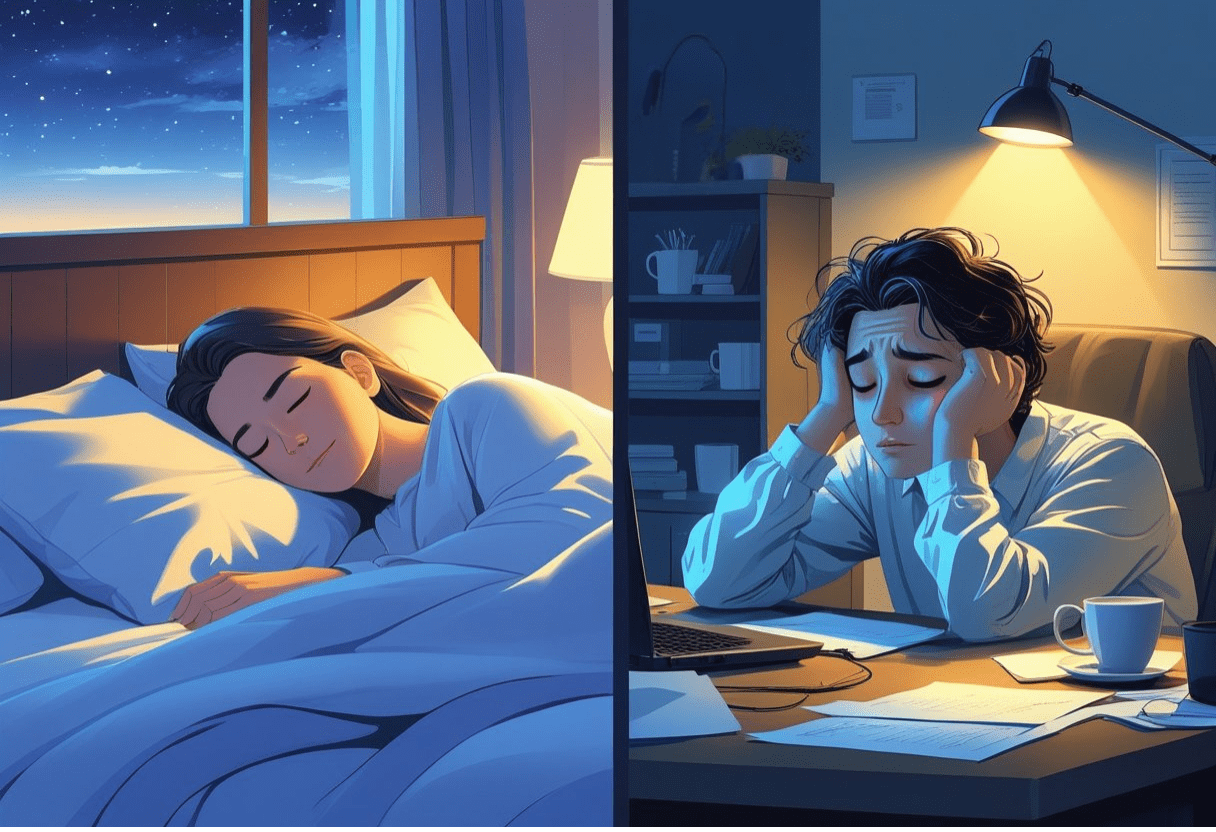
How Poor Sleep Accelerates Aging
Lack of rest slows how the body repairs itself, weakens immunity, harms brain health, and throws off hormone balance. These changes can speed up aging and raise the risk of health problems.
Cellular Repair and Immune Health
Deep sleep is when the body fixes cells and tissues. When sleep is cut short, this repair doesn’t happen as it should. Damaged cells build up, skin becomes weaker, and wounds take longer to heal. Lack of sleep can also trigger inflammation. Over time, this harms blood vessels and organs, making the heart and brain age faster. It raises the risk of conditions like heart disease and diabetes.
The immune system works best when the body is well-rested. Without enough sleep, it’s easier to catch infections and harder to recover. A weak immune system struggles to fight illnesses that come with aging.
Sleep and Cognitive Decline
Good sleep supports memory and brain health. Poor sleep can age the brain faster. Scans show that people who sleep badly have brains that look older than they should. This raises the risk of dementia and other memory problems. Sleep clears waste and harmful proteins from the brain. When sleep is lacking, these build up and may lead to Alzheimer’s. The brain can lose volume and process information more slowly.
Studies show that people with poor sleep can have brains that appear about a year older than their actual age. Inflammation from sleep problems can also damage brain cells, which worsens memory and thinking over time.
Hormones, Metabolism, and Aging
Sleep helps balance hormones that affect aging. When sleep is disrupted, hormones like cortisol rise. This puts stress on the body and speeds up aging. Growth hormone levels also drop, which affects cell repair and muscle strength. Poor sleep can upset metabolism. Blood sugar levels rise and the body may become less sensitive to insulin. This raises the chance of getting type 2 diabetes, which harms organs and shortens healthy years.
Changes in hormones can also cause weight gain, especially around organs. This is linked to early aging and long-term health issues. All of these shifts can reduce both lifespan and quality of life.

Sleep Disorders and Their Impact on Lifespan
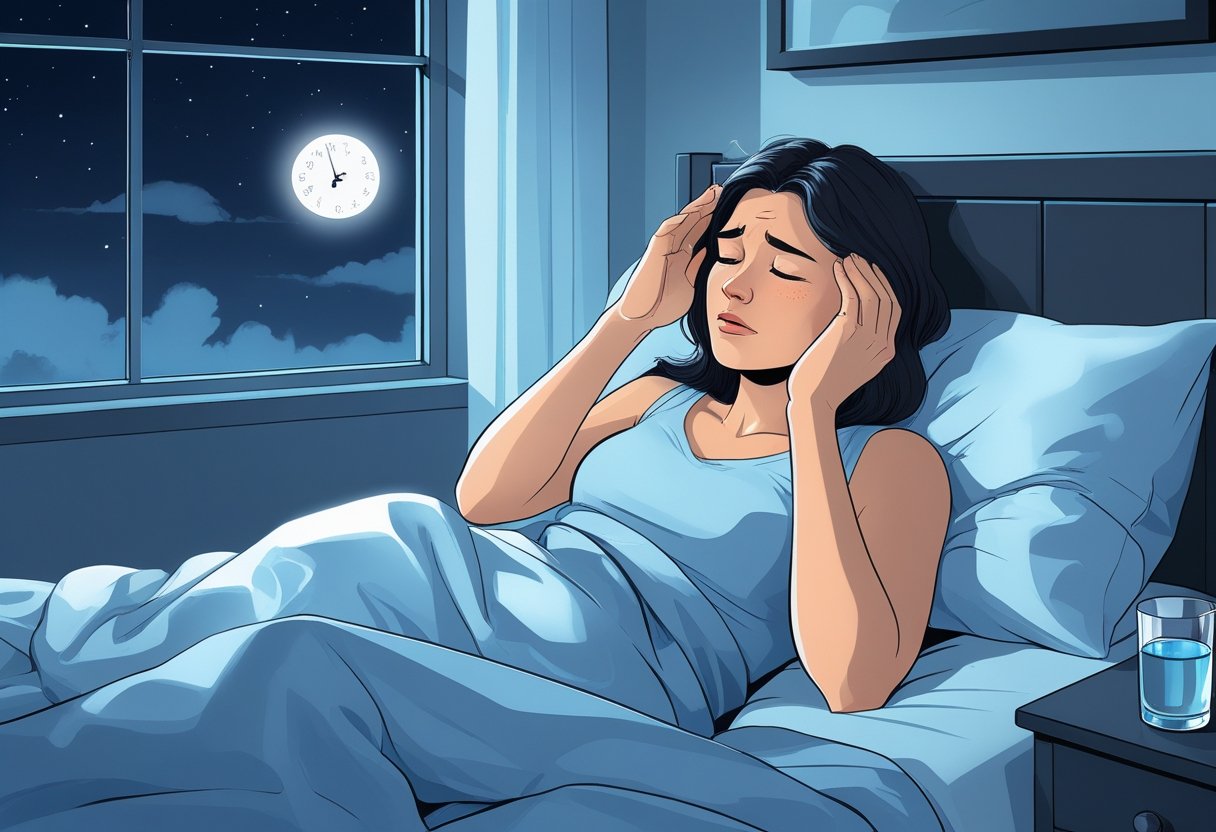
Sleep disorders affect many people and can lower both sleep quality and lifespan. These problems interrupt rest and can lead to serious health issues if ignored. Spotting the signs early can help protect your health in the long run.
Common Sleep Disorders
Some of the most common sleep disorders are insomnia, sleep apnea, and narcolepsy. Insomnia makes it hard to fall asleep or stay asleep, which leads to tiredness during the day. Sleep apnea causes breathing to stop and start during sleep. This lowers oxygen levels and puts pressure on the heart. Narcolepsy causes sudden sleep episodes during the day, even when someone isn’t tired.
These conditions stop the body from fully recovering at night. For example, sleep apnea can raise the risk of heart problems and high blood pressure. People with these issues usually wake up feeling exhausted, even after a full night in bed. Over time, this can lead to more health problems.
Long-Term Risks of Untreated Sleep Issues
When sleep problems are left untreated, they can shorten a person’s life. Poor sleep raises the chances of heart disease, stroke, diabetes, and memory decline, including conditions like Alzheimer’s. Not sleeping well also disrupts hormones, which can lead to weight gain and inflammation. These health problems build up over time if they aren’t addressed. Research shows that ongoing sleep issues can cut life expectancy by up to five years for men and two years for women.
Warning Signs of Poor Sleep
Some clear signs of poor sleep include feeling tired during the day, trouble focusing, and waking up many times at night. Needing an alarm clock to wake up regularly can be a sign that the body isn’t fully rested.
Loud snoring or gasping at night may point to sleep apnea. Other signs include mood swings, feeling easily irritated, and unintentionally falling asleep during the day. Anyone who experiences these symptoms should talk to a doctor. Getting help early can protect both daily energy and long-term health.
Building Sleep Habits That Promote Longevity
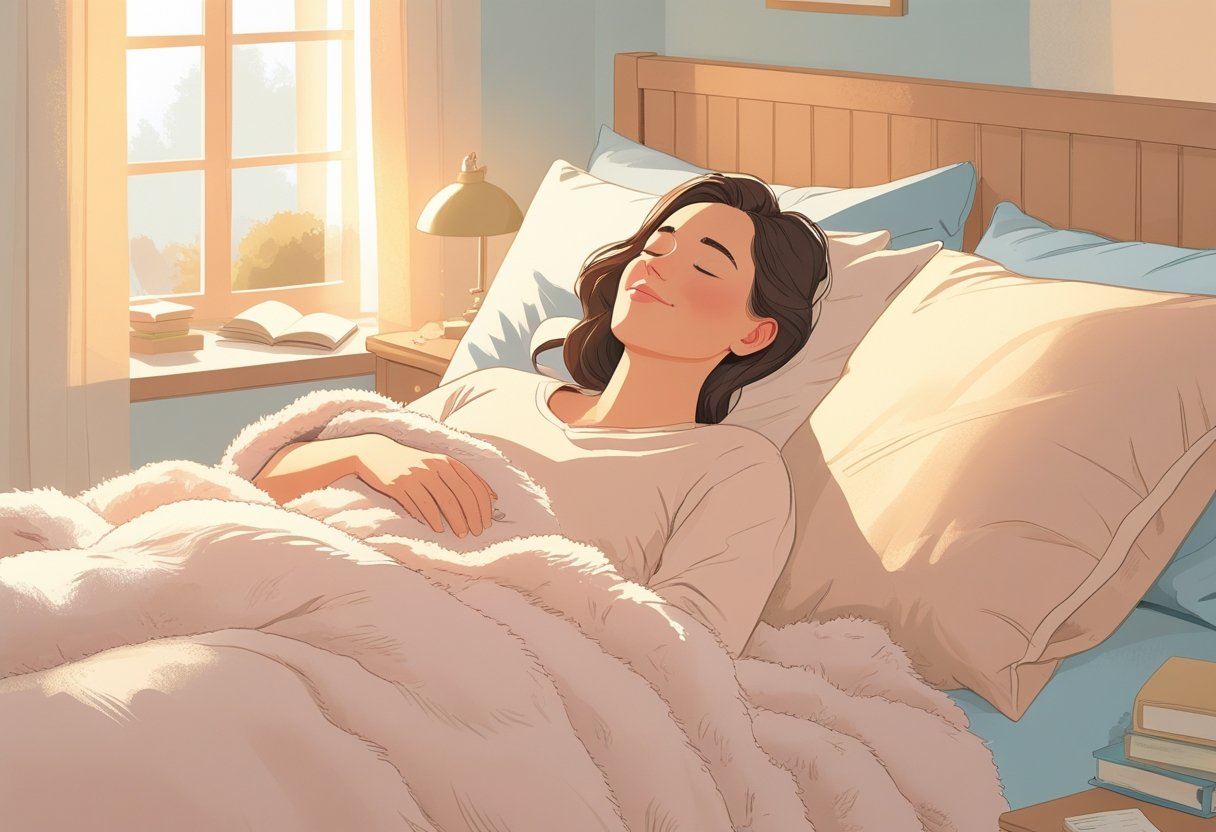
Good sleep comes from a mix of a calm environment and steady daily habits. When these two work together, sleep becomes deeper and more restful. Daily choices like what you eat, how much you move, and how you handle stress also shape how well you sleep.
Creating a Sleep-Friendly Environment
A dark, quiet, and cool room helps the body relax. Bright lights at night can interrupt your sleep rhythm, so using blackout curtains or an eye mask can help block light. If outside noise keeps you up, earplugs or a white noise machine can help keep things calm.
Your bed should be cozy and used only for sleeping or being intimate. Using your phone or watching TV in bed can delay sleep because screens give off blue light. Turning off devices at least 30 minutes before lying down can help you fall asleep faster. Keeping your room between 60–67°F (15–19°C) works best for sleep. A cooler room lets your body lower its temperature naturally, which helps you reach deeper stages of sleep.
Healthy Routines and Sleep Hygiene
Going to bed and waking up at the same time every day keeps your body on a steady schedule. Sticking to this routine, even on weekends, helps your brain know when to rest and when to wake up.
Avoid caffeine and nicotine close to bedtime. Both can keep you awake longer. Try calming activities instead, like reading a book, gentle stretching, or listening to soft music. This gives your body a clear signal that it’s time to wind down. It also helps to keep naps short and earlier in the day. Long or late naps can make it harder to sleep at night. A simple bedtime routine, like dimming the lights or breathing exercises, can help your body relax before bed.
Diet, Exercise, and Stress Management for Better Sleep
Food affects how well you sleep. Eating heavy meals late at night can cause discomfort and disrupt your rest. A light snack with tryptophan, magnesium, or calcium can help you feel calm and ready for bed. Moving your body during the day supports better sleep at night. Try to finish workouts a few hours before bedtime, since exercising too late can keep your mind and body alert.
Managing stress is just as important. Simple practices like meditation, breathing slowly, or writing in a journal can ease a busy mind. When stress levels go down, your body spends more time in deep sleep. This deep sleep helps with recovery and supports overall health as you age.
How Mattresses Support Better Sleep and Longer Life
A good mattress gives the body steady support where it’s needed most. It keeps the spine in line and eases pressure around the shoulders, hips, and back. When the bed feels right, falling asleep and staying asleep becomes easier and more natural. Breathable layers can also help with steady, cool sleep. A bed that lets air flow freely can prevent overheating at night. This kind of comfort supports the body’s natural repair cycle, which is why a stable sleep setup matters.
When a mattress starts to sag or lose shape, it’s usually time to replace it. A hybrid build, like the Brooklyn Bedding Signature Hybrid, can be a strong choice. It combines softness and support, helping sleepers stay comfortable over the years. This mattress uses foam and pocketed coils that gives a balanced, cushioned feel. It comes in soft, medium, and firm options to match different sleep styles. Many real users say it keeps movement from spreading across the bed and stays cool through the night, which adds to steady, uninterrupted rest.







